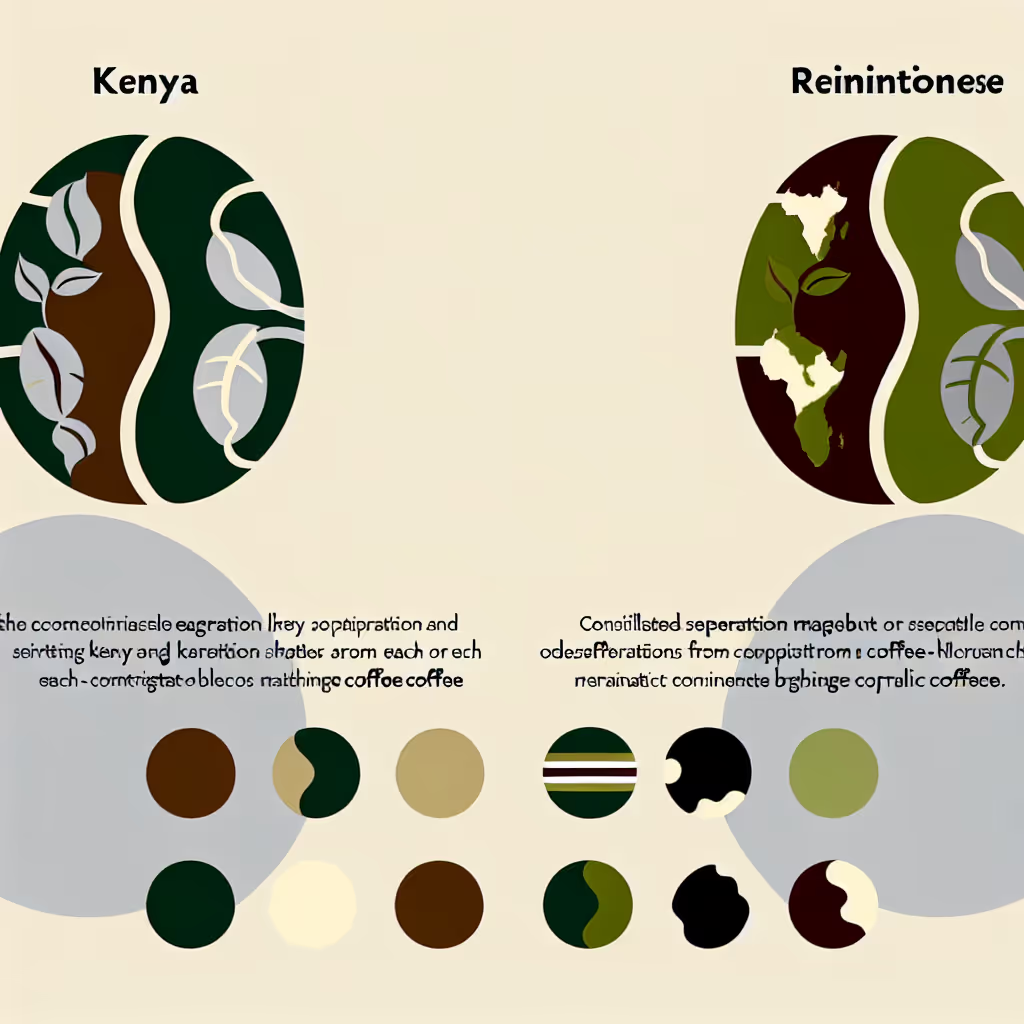Kenyan Vs. Chinese Coffee
This comparison explores the distinctive qualities of Kenyan and Chinese coffee beans, highlighting their unique flavor profiles, growing conditions, and cultural significance in the world of specialty coffee.

Brief Description
Kenyan coffee is renowned for its bright acidity, full body, and complex flavor profile. Grown in the rich volcanic soils of the Central Highlands, these beans benefit from ideal climate conditions and meticulous processing. The result is a cup that's bold, wine-like, and often described as the 'connoisseur's choice'. With notes ranging from blackcurrant to citrus, Kenyan coffee offers a truly unique and memorable tasting experience.
Chinese coffee, primarily grown in Yunnan Province, is an emerging player in the specialty coffee scene. Known for its smooth body and unique flavor profile, Chinese coffee often surprises with its complexity. The region's diverse microclimates and ancient tea-growing traditions contribute to the distinct character of these beans, offering a fascinating blend of familiar coffee notes with subtle, exotic undertones.
Importance of Comparison
Comparing Kenyan and Chinese coffee is crucial for coffee enthusiasts seeking to expand their palate. These two origins represent contrasting coffee-growing traditions and flavor profiles. Understanding their differences helps consumers make informed choices, appreciate coffee diversity, and explore new taste experiences in the ever-evolving specialty coffee market.
Key Attributes
Origin
Kenyan
Chinese


Consumer Guide
When choosing between Kenyan and Chinese coffee, consider your flavor preferences. Kenyan coffee offers a bright, wine-like acidity with notes of blackcurrant and citrus, ideal for those who enjoy bold, complex flavors. It excels in pour-over and French press brewing methods. Chinese coffee, with its smooth body and chocolate-nutty notes, is perfect for those seeking a milder, yet unique cup. It performs well in French press and espresso preparations. Consider the roast level, as it can significantly impact the flavor profile. For a true representation of each origin, opt for medium roasts. Lastly, check the processing method, as it affects the final taste. Kenyan coffees are typically washed, while Chinese coffees offer more variety in processing.
Expert Opinions
Coffee expert Maria Rodriguez notes, 'Kenyan coffee is often considered the pinnacle of brightness and complexity in the coffee world. Its unique double fermentation process contributes to its distinctive flavor.' On Chinese coffee, master roaster John Chen states, 'The emerging Chinese coffee scene is exciting. The beans from Yunnan offer a fascinating bridge between traditional and modern flavor profiles, with a smoothness that surprises many coffee professionals.'
FAQs
Kenyan coffee is known for its bright acidity, full body, and complex flavors including blackcurrant, citrus, and floral notes. Chinese coffee, on the other hand, tends to have a smoother body with chocolate, nutty, and earthy flavors. The contrast in taste is largely due to differences in growing conditions, processing methods, and coffee varieties used in each region.
For Kenyan coffee, pour-over, French press, and cold brew methods are excellent choices to highlight its bright acidity and complex flavors. Chinese coffee performs well with French press, pour-over, and espresso methods, which can accentuate its smooth body and unique flavor profile. Experimenting with different brewing techniques can help you find the perfect method to bring out the best in each origin.
Kenyan coffee is typically grown at altitudes between 1400-2100 meters in rich volcanic soils, contributing to its distinctive flavor. Chinese coffee, primarily from Yunnan province, is grown at 1200-2000 meters in diverse microclimates. These differences in altitude, soil composition, and climate play a significant role in shaping the unique characteristics of each coffee origin.
Kenyan coffees are predominantly processed using the washed method, often with a unique double fermentation process, followed by sun-drying. This contributes to their clean, bright flavor profile. Chinese coffees employ a variety of processing methods, including washed, natural, and honey processing. This diversity in processing allows for a wider range of flavor profiles in Chinese coffees.
Kenya produces approximately 50,000 metric tons of coffee annually, while China's production is significantly higher at around 130,000 metric tons. Despite the lower production volume, Kenyan coffee is highly sought after in the specialty coffee market. China's higher production reflects its growing presence in the global coffee industry, with increasing focus on quality and specialty coffee production.
For those new to specialty coffee, Chinese coffee might be a more approachable starting point due to its smoother body and familiar chocolate and nutty notes. However, adventurous beginners might enjoy exploring the bold and complex flavors of Kenyan coffee. Ultimately, trying both origins can provide a great introduction to the diverse world of specialty coffee and help develop one's palate.
Conclusion
Kenyan and Chinese coffees offer distinct and rewarding experiences for coffee enthusiasts. Kenyan beans shine with their bright acidity, full body, and complex flavor profile, making them a favorite among connoisseurs. Chinese coffee, with its smooth body and unique blend of familiar and exotic notes, represents an exciting frontier in specialty coffee. While Kenyan coffee might appeal more to those seeking bold, wine-like flavors, Chinese coffee offers a gentler introduction to unique single-origin beans. Ultimately, exploring both origins will enrich your coffee journey and broaden your appreciation for the diverse world of specialty coffee.






